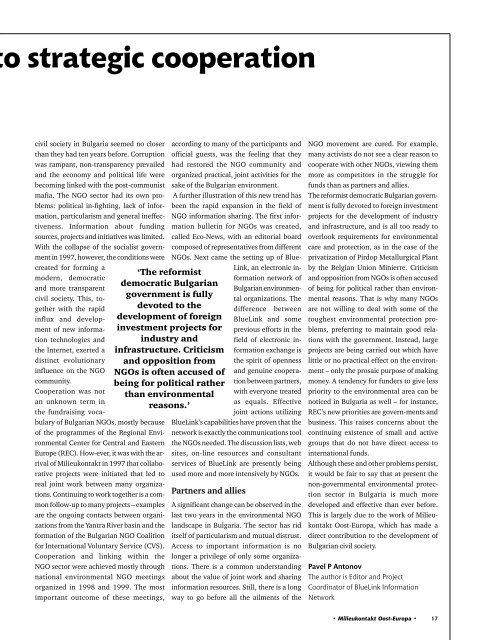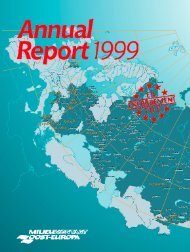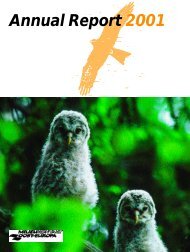Russia and Ukraine - Milieukontakt International
Russia and Ukraine - Milieukontakt International
Russia and Ukraine - Milieukontakt International
You also want an ePaper? Increase the reach of your titles
YUMPU automatically turns print PDFs into web optimized ePapers that Google loves.
o strategic cooperation<br />
civil society in Bulgaria seemed no closer<br />
than they had ten years before. Corruption<br />
was rampant, non-transparency prevailed<br />
<strong>and</strong> the economy <strong>and</strong> political life were<br />
becoming linked with the post-communist<br />
mafia. The NGO sector had its own problems:<br />
political in-fighting, lack of information,<br />
particularism <strong>and</strong> general ineffectiveness.<br />
Information about funding<br />
sources, projects <strong>and</strong> initiatives was limited.<br />
With the collapse of the socialist government<br />
in 1997, however, the conditions were<br />
created for forming a<br />
modern, democratic<br />
<strong>and</strong> more transparent<br />
civil society. This, together<br />
with the rapid<br />
influx <strong>and</strong> development<br />
of new information<br />
technologies <strong>and</strong><br />
the Internet, exerted a<br />
distinct evolutionary<br />
influence on the NGO<br />
community.<br />
Cooperation was not<br />
an unknown term in<br />
the fundraising vocabulary<br />
of Bulgarian NGOs, mostly because<br />
of the programmes of the Regional Environmental<br />
Center for Central <strong>and</strong> Eastern<br />
Europe (REC). How-ever, it was with the arrival<br />
of <strong>Milieukontakt</strong> in 1997 that collaborative<br />
projects were initiated that led to<br />
real joint work between many organizations.<br />
Continuing to work together is a common<br />
follow-up to many projects – examples<br />
are the ongoing contacts between organizations<br />
from the Yantra River basin <strong>and</strong> the<br />
formation of the Bulgarian NGO Coalition<br />
for <strong>International</strong> Voluntary Service (CVS).<br />
Cooperation <strong>and</strong> linking within the<br />
NGO sector were achieved mostly through<br />
national environmental NGO meetings<br />
organized in 1998 <strong>and</strong> 1999. The most<br />
important outcome of these meetings,<br />
‘The reformist<br />
democratic Bulgarian<br />
government is fully<br />
devoted to the<br />
development of foreign<br />
investment projects for<br />
industry <strong>and</strong><br />
infrastructure. Criticism<br />
<strong>and</strong> opposition from<br />
NGOs is often accused of<br />
being for political rather<br />
than environmental<br />
reasons.’<br />
according to many of the participants <strong>and</strong><br />
official guests, was the feeling that they<br />
had restored the NGO community <strong>and</strong><br />
organized practical, joint activities for the<br />
sake of the Bulgarian environment.<br />
A further illustration of this new trend has<br />
been the rapid expansion in the field of<br />
NGO information sharing. The first information<br />
bulletin for NGOs was created,<br />
called Eco-News, with an editorial board<br />
composed of representatives from different<br />
NGOs. Next came the setting up of Blue-<br />
Link, an electronic information<br />
network of<br />
Bulgarian environmental<br />
organizations. The<br />
difference between<br />
BlueLink <strong>and</strong> some<br />
previous efforts in the<br />
field of electronic information<br />
exchange is<br />
the spirit of openness<br />
<strong>and</strong> genuine cooperation<br />
between partners,<br />
with everyone treated<br />
as equals. Effective<br />
joint actions utilizing<br />
BlueLink’s capabilities have proven that the<br />
network is exactly the communications tool<br />
the NGOs needed. The discussion lists, web<br />
sites, on-line resources <strong>and</strong> consultant<br />
services of BlueLink are presently being<br />
used more <strong>and</strong> more intensively by NGOs.<br />
Partners <strong>and</strong> allies<br />
A significant change can be observed in the<br />
last two years in the environmental NGO<br />
l<strong>and</strong>scape in Bulgaria. The sector has rid<br />
itself of particularism <strong>and</strong> mutual distrust.<br />
Access to important information is no<br />
longer a privilege of only some organizations.<br />
There is a common underst<strong>and</strong>ing<br />
about the value of joint work <strong>and</strong> sharing<br />
information resources. Still, there is a long<br />
way to go before all the ailments of the<br />
NGO movement are cured. For example,<br />
many activists do not see a clear reason to<br />
cooperate with other NGOs, viewing them<br />
more as competitors in the struggle for<br />
funds than as partners <strong>and</strong> allies.<br />
The reformist democratic Bulgarian government<br />
is fully devoted to foreign investment<br />
projects for the development of industry<br />
<strong>and</strong> infrastructure, <strong>and</strong> is all too ready to<br />
overlook requirements for environmental<br />
care <strong>and</strong> protection, as in the case of the<br />
privatization of Pirdop Metallurgical Plant<br />
by the Belgian Union Minierre. Criticism<br />
<strong>and</strong> opposition from NGOs is often accused<br />
of being for political rather than environmental<br />
reasons. That is why many NGOs<br />
are not willing to deal with some of the<br />
toughest environmental protection problems,<br />
preferring to maintain good relations<br />
with the government. Instead, large<br />
projects are being carried out which have<br />
little or no practical effect on the environment<br />
– only the prosaic purpose of making<br />
money. A tendency for funders to give less<br />
priority to the environmental area can be<br />
noticed in Bulgaria as well – for instance,<br />
REC’s new priorities are govern-ments <strong>and</strong><br />
business. This raises concerns about the<br />
continuing existence of small <strong>and</strong> active<br />
groups that do not have direct access to<br />
international funds.<br />
Although these <strong>and</strong> other problems persist,<br />
it would be fair to say that at present the<br />
non-governmental environmental protection<br />
sector in Bulgaria is much more<br />
developed <strong>and</strong> effective than ever before.<br />
This is largely due to the work of <strong>Milieukontakt</strong><br />
Oost-Europa, which has made a<br />
direct contribution to the development of<br />
Bulgarian civil society.<br />
Pavel P Antonov<br />
The author is Editor <strong>and</strong> Project<br />
Coordinator of BlueLink Information<br />
Network<br />
• <strong>Milieukontakt</strong> Oost-Europa • 17





